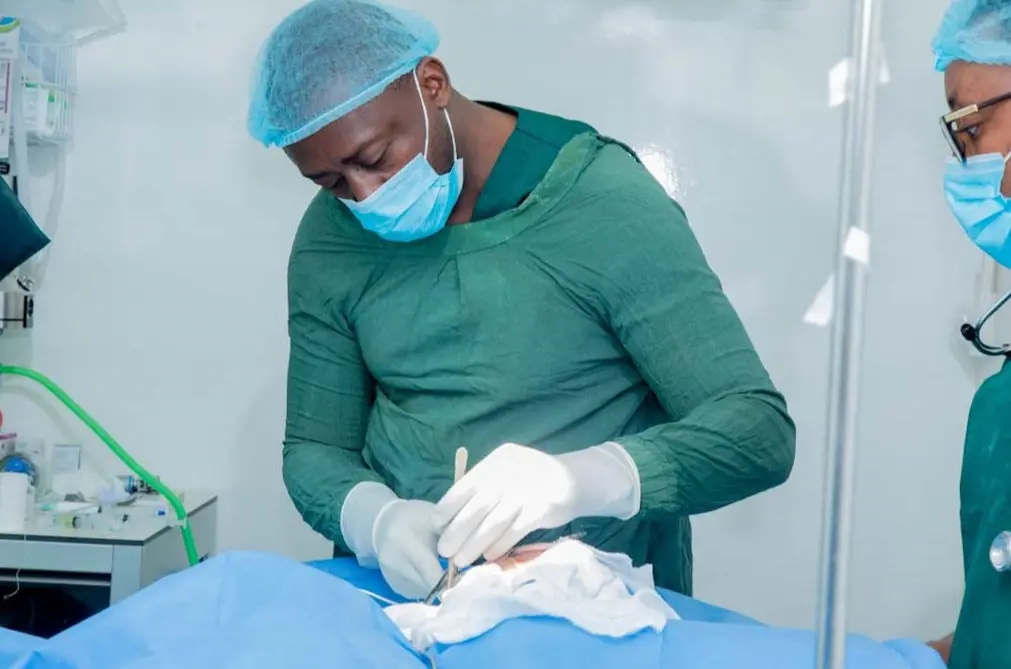Sehemu ya Magonjwa ya Mfumo wa Fahamu

Idara ya Upasuaji wa Ubongo na Mishipa ya Fahamu katika Hospitali ya Benjamin Mkapa (BMH) ni mfano wa ubora, ikiwa na dhamira ya kutoa huduma bora za upasuaji wa neva kwa kuzingatia ushahidi wa kisayansi, teknolojia ya kisasa, ushirikiano wa kitaaluma, na ubunifu endelevu. Idara hii ilianzishwa mwaka 2021 kwa lengo la kutoa huduma za upasuaji wa neva kwa watoto na watu wazima wenye magonjwa na matatizo changamani ya ubongo, uti wa mgongo, na mishipa ya fahamu ya pembeni.
Tangu kuanzishwa kwake, idara hii imekuwa nguzo muhimu katika kushughulikia hali tata za upasuaji wa neva, zikiwemo uvimbe wa ubongo, majeraha ya kichwa, matatizo ya uti wa mgongo, kifafa, na matatizo ya kuzaliwa kama spina bifida na hydrocephalus. Idara imekua kwa kasi na sasa inapokea zaidi ya wagonjwa 3,000 kila mwaka na kufanya zaidi ya upasuaji 500 wa kuokoa maisha, ikionyesha athari chanya na dhamira ya kutoa huduma bora za kitabibu.
Huduma za Idara
- Huduma za Upasuaji wa Neva: Tiba ya hali mbalimbali kwa watoto na watu wazima, zikiwemo majeraha ya kichwa, kiharusi, uvimbe wa ubongo na uti wa mgongo, na matatizo ya kazi ya ubongo kama kifafa na maumivu sugu.
- Huduma za Upasuaji: Kuna chumba maalum cha upasuaji wa neva kinachofanya kazi saa 24 kwa siku kwa ajili ya upasuaji wa dharura na uliopangwa. Huduma zinazotolewa ni pamoja na:
ü Craniotomy
ü Uwekaji wa VP Shunt
ü Endoscopic Third Ventriculostomy (ETV)
ü Uondoaji wa uvimbe wa ubongo
ü Upasuaji wa uti wa mgongo
ü Upasuaji wa watoto kwa matatizo kama spina bifida, encephalocele, na hydrocephalus
ü Mpango wa kuanzisha kitengo cha angiografia kwa upasuaji wa mishipa ya damu
- Huduma za Neurotrauma: Kitengo maalum kwa ajili ya majeraha ya mfumo wa fahamu, chenye vifaa vya kisasa na wataalamu wa upasuaji wa neva pamoja na wauguzi waliobobea.
- Huduma kwa Waliopata Kiharusi: Tiba maalum kwa wagonjwa waliopata kiharusi kwa haraka na kwa weledi kupitia mpango maalum wa huduma ya kiharusi.
- Upasuaji wa Neva wa Kazi (Functional Neurosurgery): Matibabu ya kifafa, matatizo ya mwendo, na maumivu sugu ya kudumu.
Wafanyakazi na Utaalamu
- Madaktari wa Upasuaji wa Neva: Idara ina madaktari bingwa watatu waliobobea katika maeneo mbalimbali kama upasuaji wa msingi wa fuvu (skull base), neurotrauma, uti wa mgongo, na upasuaji wa kuingilia mishipa (neurointervention), pamoja na daktari bingwa wa upasuaji wa jumla na madaktari wawili wa kawaida.
- Wauguzi na Wahudumu wa Afya: Wanaoshiriki kikamilifu katika huduma za wodi, vyumba vya upasuaji, na shughuli za uhamasishaji jamii.
- Ushirikiano wa Kitaaluma: Kushirikiana na idara za ENT, Macho, na Tiba ya Miondoko pamoja na ushirikiano wa kielimu na Chuo Kikuu cha Dodoma (UDOM) kwa ajili ya matibabu jumuishi.
Miundombinu na Teknolojia
- Miundombinu ya Kisasa: Vyumba vitatu vya kliniki ya wagonjwa wa nje, chumba maalum cha taratibu, vitanda 40 vya kulaza wagonjwa, na chumba maalum cha upasuaji wa neva.
- Vifaa vya Kisasa: Mashine za EEG, vifaa maalum vya upasuaji wa mishipa ya fahamu na uti wa mgongo, vifaa vya endoscopy, C-Arm, pamoja na huduma ya 3T MRI na CT Scan ya vipande 256 kwa uchunguzi wa hali ya juu.
- Miundombinu ya Baadaye: Kuna mpango wa kuanzisha ICU maalum kwa upasuaji wa neva (Neuro-ICU) na kuongeza uwezo wa vyumba vya upasuaji.
Mafanikio na Hatua Muhimu
- Kuongezeka kwa Wagonjwa: Idadi ya wagonjwa wa kliniki imeongezeka kwa 100% na upasuaji umeongezeka kwa 30%.
- Kupunguza Rufaa: Idara imepunguza kwa kiasi kikubwa rufaa za wagonjwa kwenda hospitali nyingine, ikithibitisha uwezo wa kushughulikia kesi tata ndani ya hospitali.
- Ushirikiano wa Kimataifa: Kufanikisha mafunzo, ujenzi wa uwezo, na kubadilishana maarifa na taasisi za kimataifa.
Mipango ya Baadaye
- Kuanzisha Kitengo Kamili cha Kiharusi: Katika hatua za mwisho za maandalizi, kitengo hiki kitapokea wagonjwa wa kiharusi na kuwahudumia kwa njia ya kitaalamu kwa kutumia vifaa vya kisasa vya ufuatiliaji na ukarabati.
- Ujenzi wa Uwezo: Mafunzo ya kuendeleza wataalamu bingwa zaidi pamoja na wauguzi wa upasuaji wa neva.
- Mipango ya Kielimu: Ushirikiano wa kielimu na UDOM na COSECSA kwa ajili ya kukuza taaluma ya upasuaji wa neva.
- Utalii wa Matibabu: Kuiweka BMH kama kituo bora cha upasuaji wa neva katika ukanda wa Afrika Mashariki.
- Ufanisi wa Kiutendaji: Kuweka huduma ya upasuaji saa 24 na kuboresha ratiba za kliniki kwa kutumia ujumbe mfupi wa maandishi na mifumo ya mtandaoni.
- Teknolojia Mpya: Kutumia teknolojia ya neuronavigation na vifaa vya picha vinavyotumika wakati wa upasuaji.
Idara ya Upasuaji wa Ubongo na Mishipa ya Fahamu ya Hospitali ya Benjamin Mkapa inaendelea kuwa kielelezo cha ubora katika huduma za afya za kisasa, na inaendelea kujitanua ili kukidhi mahitaji ya wagonjwa wa ndani na nje ya nchi.

